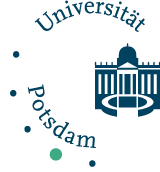
Maryam Lashari
Master of Philosophy Management
Campus Griebnitzsee
DFG-Research Training Group "WIPCAD"
University of Potsdam
Department of Economics
and Social Sciences
August-Bebel-Straße 89
14482 Potsdam, Germany
Office: Campus Griebnitzsee, House 7,
Room 3.07.211-15
Research Topic
"Women and the Leadership Labyrinth: A case of Higher Education Sector, Pakistan"
Curriculum vitae
ACADEMIC TRAINING
2013–2015
Master of Philosophy Management EQF level 7 at Institute of Administrative Sciences, University of the Punjab, Lahore (Pakistan)
2009–2013
Bachelor of Science Hon's Management Sciences
PROFESSIONAL EXPERIENCE
2017–2019
Assistant Director Enforcement at Walled City Lahore Authority, Lahore (Pakistan)
2014–2017
Lecturer (Management/Public Administration) at University of Sargodha, Lahore Campus, Paksiatn, Lahore (Pakistan)
2012–2012
Human Resources Intern at Shoukat Khanum Memorial Hospital & Research Center, Lahore (Pakistan)
2011–2011
Human Resources Intern at United Bank Limited, Sheikhupura (Pakistan)
PUBLICATIONS
2016
Impact of organizational trust on organizational justice and organizational commitment: A case of university of Sargodha. Published in Research Society of Pakistan, ISSN-0034-5431, Vol. 53, No. 2, July.-Dec. 2016 http://pu.edu.pk/home/journal/14/Current-Issue.html
2015
Research Paper titled, “Effect of Customer Relationship Management on Customer Satisfaction” has been accepted for oral presentation and publication at World Conference on Business, Economics and Management, under the aegis of Thomson Reuters ISI (Web of Knowledge http://www.sciencedirect.com/science/article/pii/S2212567115005134
CONFERENCE PAPERS
2016
Presented Research Paper at 1st International Research Conference on Economics, Business and Social Sciences April 12-13, 2016 Venue 1: Holiday Inn Hotel Penang, Malaysia, Venue 2: School of Economics, Bahauddin Zakariya University Multan Pakistan www.bzu.edu.pk/ecoconf.pdf act of Impact of organizational trust on organizational justice and organizational commitment: A case of university of Sargodha. Published in research society of Pakistan, ISSN-0034-5431, Vol. 53, No. 2, July.-Dec. 2016 pu.edu.pk/home/journal/14/Current-Issue.html
Abstract
The lack of females in leadership positions has been an issue for many women in the workplace for decades, but recently has become an even bigger concern and more public (Lindbald, 2019). Women’s educational attainment and workforce ranks have continually increased, however their advancement into the upper echelons of management has stalled in recent years (Sokolowska, 2018). To address this issue of lack of female executives, there are initiatives around the world aimed at closing the women’s leadership gap. In a large number of professional organizations women still encounter subtle barriers in their upward career progression especially when it comes to attain the highest echelons of management while equivalent men just careen along with a comparative ease (Gatrell & Swan, 2008).This phenomenon of invisible barrier in the career advancement of female managers is commonly termed as ‘glass ceiling’.Eagly and Carli (2008), in their article, ‘Women and the Labyrinth of Leadership’ presented a new angle to the research concerning the glass ceiling for women in professional organizations by rejecting the phenomenon of glass ceiling as the sole hurdle in the career path of professional women. While women are certainly underrepresented within leadership positions, the presence of female in mid-level and some senior leadership positions suggests that a once impenetrable barrier (e.g., glass ceiling) is now more porous. Thus, perhaps a shift in management research from a focus on glass ceilings to an examination of the perception of a leadership labyrinth is necessary (Eagly & Carli, 2007).The scholars of tourism studies have long argued that tourism is a highly gendered industry (Figueroa-Domecq, 2019).Despite the significant contribution tourism workers make to the global hospitality, tourism, and travel industry, substantial levels of sexual discrimination remain (Stephen et al., 2014). Pakistani culture has a strong collectivist orientation which binds every individual to their communities and collectivises very closely and inspires strong conformity pressures (Thakur, 2019). Female workers continue to struggle with discrepancies in job status and pay, as well as to overcome stereotypes and other barriers to workplace equality (Burrell, Manfredi, & Rollin, 1997; Nepur, Deepa & Khimya, 2013; Wan, 2014).This study aims to study the process of career progression of women, what barriers they face and how they navigate through them in the specific cultural context of Pakistan using the lens of leadership labyrinth in the Tourism Sector.
